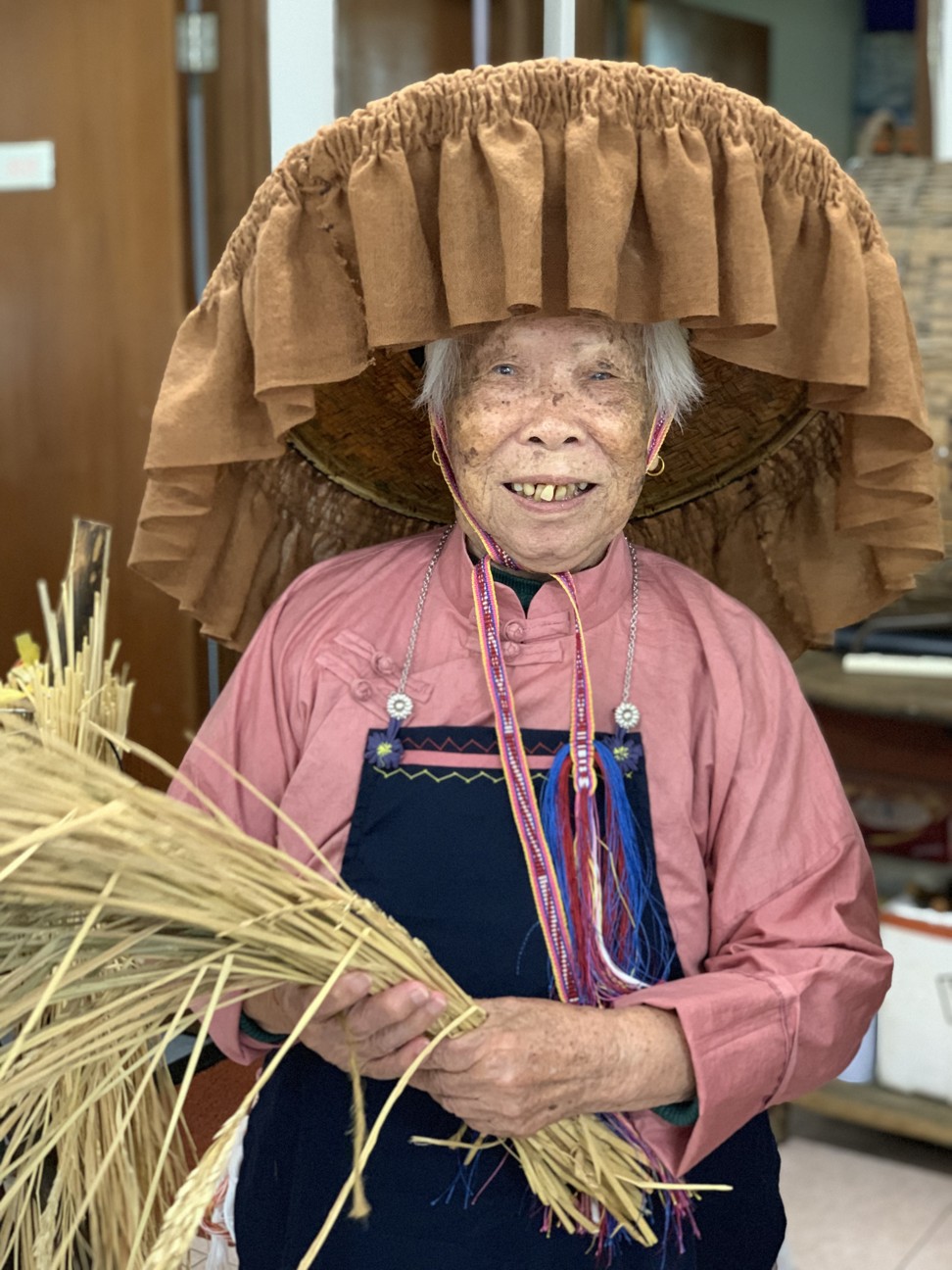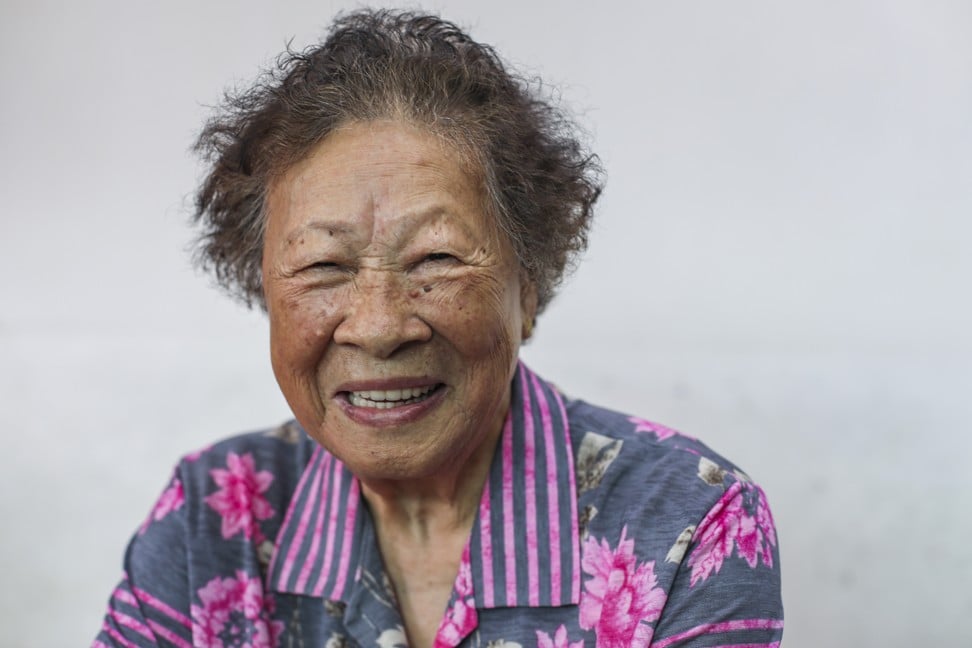
Hong Kong arranged marriage heartbreak: the bridal laments women sang before leaving home
- Young women, often unschooled, were found husbands by matchmakers, and last days before marrying strangers were spent crying and singing songs of sadness
- The laments these Weitou women sang, passed down through generations, have been recorded, along with the stories of their lives, in a documentary film
Her eyesight failing, Liu Kam-lan sits, hands clasped together, with social workers from the Caritas NGO in San Uk Tsuen, a village in Hong Kong’s New Territories a few kilometres from the border with China. Around her, other elderly women chat and laugh.
She is asked to sing. In a lilting voice, she begins a “bridal lament” in the disappearing dialect of the Weitou people, who settled in the area during the Song dynasty (960-1279). The dialect is still spoken by elderly people in the old walled villages around Lung Yeuk Tau.
The song is one of sadness, and tells a story dating back more than 60 years. Like other young women, Liu was told by her mother to climb the wooden steps into the cockloft of her family’s home. There she would lie on a mat for several days while friends came to say goodbye, before she was married off to a man she had never met.
A few days later she would leave her home village forever – a new bride in a sedan chair.
This was the life of a Weitou woman. In their bridal laments are words of anger and bile for the matchmaker they felt betrayed them.
“In the darkness, by the wooden rail. On a regal seat you settle, accusations I bellow,” the song Berating the Matchmaker begins.

Several of the women received no schooling and the songs were taught orally and passed down through generations. The matchmaker would have been a woman in the village tasked with finding young women of marriageable age to wed men from other villages, a tradition that continued in rural Hong Kong into the 1960s. The seven women gathered in San Uk Tsuen this day are the last of that generation.
Two chose their own husbands, the rest had marriages arranged, as happened in many parts of China when these women were young. Not all marriages were bad, the social workers say, but some women were unhappy living a life of obedience and servitude, and have only found freedom in their twilight years following the deaths of their husbands.
Berating the Matchmaker accuses the broker of treacherous acts: “I am shamed and wretched that we are in the same clan … who do you think you are to take the best seat in my home? I’m going to snap a willow sprig to drive the evil you away.”

These women’s oral histories and songs have been recorded in a book and on a CD. A documentary, Yesterday Once More, will be shown at the Tai Kwun Centre for Heritage and Arts in Hong Kong’s Central district on Friday evening. They are the fruit of the Caritas Lung Yeuk Tau Community Development Project, with which social worker Chan Kwok-ming, 50, has been involved for the past 19 years.
“Lung Yeuk Tau has a long tradition of culture,” he says. “So we use this to find out what things the people will have the confidence to express.”
The women have inner strength, Chan says, and through recording and writing down the laments, learning their Weitou form of weaving, and regenerative rice-growing projects – in which the women teach young students – Chan and others involved in the project have helped them celebrate their culture and lift their self-esteem.
When I look back at my childhood, I think it’s utterly tragic. Children nowadays are taken care of by adults, but in my day you had to work as a child
Jeanne Ng Lok-chi, 40, worked with the women for 11 years as a Caritas social worker before taking up a marketing job with a rice firm. She still returns, and says the women have had an enormous influence on her life.
“When we began it was very sad. These women felt their lives were nothing, that the tragedy they had been through wasn’t worth telling,” she says. But then they started to open up, and their oral history and bridal lament songs have been preserved for generations to come, funded by donors including the Wilson Heritage Trust.
Yesterday Once More is the fruit of years spent building trust between the Weitou women and the social workers of the Caritas development project, which started in 1990.

The Lung Yeuk Tau area comprises five villages with a 700-year history, close to what is now the new town of Fanling. While ancestral halls and other buildings still stand, agricultural land and paddy fields have been replaced by modern three-storey homes and car parks.
The opening scenes from the documentary show an old woman exercising, village walls and other aspects of daily life there. Then the women talk of their hard work collecting wood in the hills, sometimes three times a day, and the grind of growing rice with a baby on your back.
They are excited by the chance to tell their stories, often tragic, of a hard life farming with minimal belongings, of parents who died young, of not being able to return to their families and of their sadness and sense of dread of what awaited them in marriage.

At 91, Man Kam-hop is the oldest of the women. Robust, with short white hair and a gaps between her teeth when she smiles, she was 25 when she married.
“I grew up in San Tin village. I started helping my parents at the age of nine and never studied. All the kids did that. We farmed rice and I was responsible for looking after the buffalo … I’d ride on its back and sing folk songs,” she explains.
“When I look back at my childhood, I think it’s utterly tragic. Children nowadays are taken care of by adults, but in my day you had to work as a child. Boys weren’t that interested in me as a potential wife because they did not like the way I rode a buffalo like a man.”

Leung Siu-ha moved south to the then British colony in 1962 at the age of 20 from the then sleepy border village of Shenzhen, which is now a high-rise economic powerhouse.
“I came here because a relative of my stepmother lived here. When my stepmother visited her, the relative asked her if she had any stepdaughters of an appropriate age to get married. So I came here.”
Before the Chinese Communist revolution in 1949, Leung’s folks were rich, she says.
I was just told that you have to obey your husband and obey your in-laws. Nothing else. Just obey
“My family owned a fireworks factory; we had paddy fields and servants. My mother died when I was young. Later we were part of a farming collective. There was very little food … less than one bowl of rice per person a day and we would supplement it with sweet potato.”
Man Fung-king, 84, came from San Tin village and met her husband through a matchmaker.
“We were introduced at a restaurant. I was frightened, nervous. I did not know how to express myself. I was 17 and got married at 18. We were surrounded by loads of people from both families at this restaurant in Sheung Shui,” another border town.

Before the wedding she spent three nights in the cockloft, the upper level of a traditional Chinese village house. “When my friends came to visit me, I just cried and we sang together.”
While the women have shared their lives with their social workers, they are reticent about going into too much detail about their marriages. Did they know about what would happen after the wedding? Any chats about sex?
“I was just told that you have to obey your husband and obey your in-laws. Nothing else. Just obey,” says Leung.

Another bridal lament is called Layering the Chest – a reference to how the bride-to-be and her father would pack a camphor chest with clothing.
“I spent four nights in the cockloft,” says Liu. “Then I layered the chest. I cried. I married at 22. My parents had already died so my aunts took [my father’s] role and they layered the chest with me. There were 50 items of clothes – shirts, trousers.”
Social worker Ng says she will remember the bridal laments for the rest of her life. When the elderly women sing them, she forgets how old they are.

“We are women to women. We just share common feelings of how we face challenges in our family and society. Through these songs you see them as young women,” she adds.
“These grannies are the last remaining women who know how to sing these laments and who actually have experienced those wedding ceremonies. If we don’t pass the knowledge on to the next generation, these bridal laments could be lost forever.”
Yesterday, Once More premiere and talk, Friday, May 17, 7pm-9.30pm, Laundry Steps, Tai Kwun
